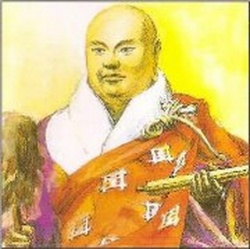Casting off the transient and revealing the true
casting off the transient and revealing the true
発迹顕本 ( Jpn hos-shaku-kempon )
The revealing of a Buddha's true status as a Buddha, and the setting aside of that Buddha's provisional or transient identity. In the "Life Span" (sixteenth) chapter of the Lotus Sutra, Shakyamuni declares: "In all the worlds the heavenly and human beings and Asuras all believe that the present Shakyamuni Buddha, after leaving the palace of the Shakyas, seated himself in the place of Meditation not far from the city of Gayaand there attained supreme perfect Enlightenment. But good men, it has been immeasurable, boundless hundreds, thousands, ten thousands, millions of nayutas of Kalpas since I in fact attained Buddhahood.
" Through this statement, he discards his provisional identity as The Buddha who first attained Enlightenment under the Bodhi tree in India and reveals his original Enlightenment, or the enlightenment he attained numberless major World system dust particle Kalpas in the past.This concept has also been applied to Nichiren (1222-1282), who wrote in The Opening of the Eyes: "On the twelfth day of the ninth month of last year [1271], between the hours of the rat and the ox [11:00 .. to 3:00 ..], this person named Nichiren was beheaded. It is his soul that has come to this island of Sado and, in the second month of the following year, snowbound, is Writing this to send to his close disciples" (269).
Nichikan (1665-1726), the twenty-sixth chief priest of Taiseki-ji temple, who was known for his commentaries on Nichiren's writings, interpreted this passage on two levels: First, the phrase "this person named Nichiren was beheaded" corresponds to the passage from the Lotus Sutra that reads, "Ignorant people will attack us with swords and staves"; and "his soul that has come to this island of Sado" corresponds to the Lotus Sutra passage "again and again we will be banished."
This, Nichikan said, shows that Nichiren is the votary of the Lotus Sutra who lives in the spirit expressed in the Sutra to "care nothing for our bodies or lives but are anxious only for the unsurpassed way." Second, Nichikan attributed a deeper significance to these passages, citing another passage from Nichiren's Writing Persecution by Sword and Staff that reads, "All the Buddhas of the past, present, and future attain Enlightenment during the hours of the ox and the tiger [1:00-5:00 ..]" (965), and compares this with the above passage from The Opening of the Eyes.
"The hours of the rat and the ox" indicates the time Nichiren as an ordinary person died; hence the phrase "this person named Nichiren was beheaded." Because the "hour of the tiger" is the time immediately following Nichiren's attempted execution, Nichikan interprets this to indicate the time Nichiren as The Buddha was born; hence the phrase "It is his soul that has come to this island of Sado." In identifying Nichiren as The Buddha of the Latter Day of the Law, Nichikan also referred to a passage from Nichiren's Reply to Kyo'o that reads, "I, Nichiren, have inscribed my Life in sumi ink, so believe in the Gohonzon with your whole Heart. The Buddha's will is the Lotus Sutra, but the soul of Nichiren is nothing other than Nam-myoho-renge-kyo" (412).
